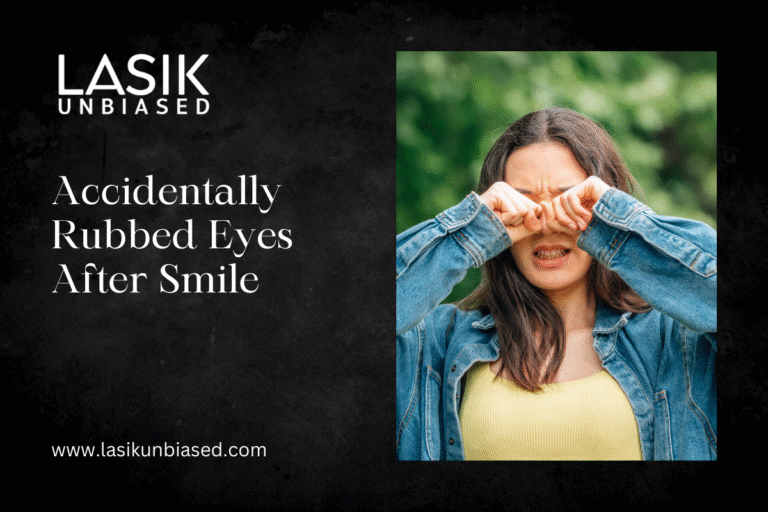If you’ve accidentally rubbed your eyes after undergoing SMILE surgery, stay calm.
While it’s essential to be cautious after this procedure, a single mishap doesn’t automatically mean complications, provided there is no significant pain, visual changes, or discomfort thereafter.
Small Incision Lenticule Extraction (SMILE) is a modern and minimally invasive laser vision correction surgery. It offers quicker recovery times and reduced sensitivity compared to other procedures like LASIK. However, as with any surgical treatment, post-operative care is crucial for optimal healing. This blog will guide you through what you should do if you accidentally rub your eyes after SMILE and what to watch out for during recovery.
Why Is Avoiding Eye Rubbing After SMILE Important?
Rubbing your eyes after SMILE surgery can disrupt the natural healing process. Though SMILE surgery does not involve a flap (unlike LASIK), the corneal lenticule created during the procedure needs time to integrate and heal. Rubbing can trigger irritation, inflammation, or, in rare cases, disrupt the surgical site.
The first 24- 48 hours after surgery is the most critical phase for your corneas. During this period, the surface of your eye is healing, and rubbing may:
- Introduce bacteria, increasing the risk of infection.
- Delay the recovery process.
- Cause unnecessary pressure on the corneal area, leading to discomfort.
Understanding the potential risks will help you give your eyes the care they need to ensure proper healing.
Common Reactions to Rubbing Your Eyes Post-SMILE
If you accidentally rub your eyes shortly after surgery, you may notice any of the following:
- Mild Discomfort: Some irritation or sensitivity may occur, but should subside shortly.
- Watery Eyes: This could happen as your eyes are more sensitive during recovery.
- Temporary Blurriness: A brief episode of blurry vision isn’t unusual and usually doesn’t indicate serious issues unless it persists.
However, if you experience severe pain, prolonged blurriness, redness, or signs of infection, it’s essential to seek medical advice immediately. Prompt attention can prevent potential complications.
Steps to Take After Accidentally Rubbing Your Eyes
Accidentally rubbing your eyes after SMILE doesn’t necessarily lead to problems, but you should take these measures to be safe:
1. Stay Calm and Assess How You Feel
Take a deep breath and observe your eyes. Do you have any unusual symptoms like pain, redness, or swelling? If not, chances are your eyes remain unharmed, especially if the touch was gentle and brief.
2. Rinse With Prescribed Eye Drops
Lubricating or antibiotic eye drops provided by your doctor can help soothe irritation. If you suspect any contaminants got into your eye while rubbing, gently using the eye drops can minimise the risk of further issues.
3. Avoid Further Touching
Touching your eyes again can increase irritation or inadvertently introduce bacteria. Use a clean tissue to dab tears or moisture near your eyes, but avoid direct contact.
4. Monitor Symptoms
Keep an eye on your symptoms for the rest of the day. If vision deteriorates or you experience ongoing discomfort, don’t hesitate to consult your ophthalmologist.
5. Contact Your Eye Surgeon if Needed
If you’re unsure about the severity of the rubbing or notice prolonged symptoms, it’s better to err on the side of caution and contact your surgeon’s office.
Prevention Tips to Avoid Eye Rubbing Post-SMILE
Accidents happen, but there are several ways to minimise the chances of eye rubbing after SMILE surgery:
1. Wear Protective Glasses
Protective eyewear provided by your clinic serves two purposes. It shields your eyes from dirt and bacteria and acts as a physical barrier to prevent subconscious rubbing during sleep.
2. Apply a Cold Compress for Itchy Eyes
Sometimes, the healing process can make eyes feel itchy or irritated. Use a clean cloth dampened with cold water to gently dab around the eye area to alleviate itchiness without touching your eyes.
3. Keep Your Hands Occupied
People often rub their eyes out of habit. Occupy your hands with something like a stress ball to reduce the likelihood of unintentional touching.
4. Stay Hydrated
Dry eyes can intensify the urge to rub. Drink plenty of water and use artificial tears as instructed to ensure sufficient hydration for your eyes.
5. Set Reminders for Eye Drop Application
Prescribed eye drops help with lubrication and healing. Set alarms to apply them as directed, preventing dryness that may provoke rubbing.
Recognising When to See an Ophthalmologist
Occasional rubbing doesn’t typically lead to serious concerns after SMILE. However, be attentive to symptoms that signal complications, such as:
- Unusual Pain: Persistent discomfort is not normal and could indicate underlying issues.
- Redness That Spreads: This could be a sign of inflammation or infection.
- Changes in Vision: Sudden or prolonged blurriness, halos, or flashes of light warrant medical attention.
Contact your ophthalmologist immediately if you notice any of these signs. Early intervention ensures quicker resolution and avoidance of secondary problems.
Long-Term Healing After SMILE Surgery
Recovery from SMILE surgery typically spans one to two weeks for full adjustment in vision clarity, with most discomfort resolving within the first few days. Some general practices to ensure a smooth recovery include:
- Limiting exposure to screens for extended periods to avoid eye strain.
- Wearing sunglasses outdoors to protect your healing eyes from sunlight and wind.
- Avoiding swimming pools and hot tubs during the first week due to the risk of infection.
- Skipping activities like strenuous exercise or wearing eye makeup for the first week to prevent irritation.
Gentle, consistent care during the recovery phase paves the way for lasting results.
Final Thought
Rubbing your eyes after SMILE surgery may seem alarming, but it’s often not as detrimental as you might fear. By knowing the precautions to take and recognising potential red flags, you can confidently manage your recovery.
To ensure your healing progresses smoothly, follow all post-operative care instructions provided by your healthcare professional. And, if you’re unsure about your reaction or need guidance, speak to your ophthalmologist right away.
Remember, your vision is precious, and taking simple precautions can make a significant difference in your healing process.


